Financial System Adaptability and Resilience
This research group investigates critical aspects of financial system adaptability and resilience. First, it analyses the impact of natural disasters on financial systems. Second, the group aims to investigate the effects of political preferences for the green transition. Third, the group's research analyses the role of culture in economies.
Research Cluster
Financial Resilience and RegulationYour contact

Mitglied - Department Financial Markets
EXTERNAL FUNDING
07.2016 ‐ 12.2018
Relationship Lenders and Unorthodox Monetary Policy: Investment, Employment, and Resource Reallocation Effects
Leibniz Association
We combine a number of unique and proprietary data sources to measure the impact of relationship lenders and unconventional monetary policy during and after the European sovereign debt crisis on the real economy. Establishing systematic links between different research data centers (Forschungsdatenzentren, FDZ) and central banks with detailed micro-level information on both financial and real activity is the stand-alone proposition of our proposal. The main objective is to permit the identification of causal effects, or their absence, regarding which policies were conducive to mitigate financial shocks and stimulate real economic activities, such as employment, investment, or the closure of plants.
01.2015 ‐ 12.2019
Interactions between Bank-specific Risk and Macroeconomic Performance
German Research Foundation (DFG)
Refereed Publications

The Impact of Technology and Regulation on the Geographical Scope of Banking
in: Oxford Review of Economic Policy, No. 4, 2004
Abstract
We review how technological advances and changes in regulation may shape the (future) geographical scope of banking. We first review how both physical distance and the presence of borders currently affect bank lending conditions (loan pricing and credit availability) and market presence (branching and servicing). Next we discuss how technology and regulation have altered this impact and analyse the current state of the European banking sector. We discuss both theoretical contributions and empirical work and highlight open questions along the way. We draw three main lessons from the current theoretical and empirical literature: (i) bank lending to small businesses in Europe may be characterized both by (local) spatial pricing and resilient (regional and/or national) market segmentation; (ii) because of informational asymmetries in the retail market, bank mergers and acquisitions seem the optimal route of entering another market, long before cross-border servicing or direct entry are economically feasible; and (iii) current technological and regulatory developments may, to a large extent, remain impotent in further dismantling the various residual but mutually reinforcing frictions in the retail banking markets in Europe. We conclude the paper by offering pertinent policy recommendations based on these three lessons.

Softening Competition by Inducing Switching in Credit Markets
in: Journal of Industrial Economics, No. 1, 2004
Abstract
We show that competing banks relax overall competition by inducing borrowers to switch lenders. We illustrate our findings in a two-period model with adverse selection where banks strategically commit to disclosing borrower information. By doing this, they invite rivals to poach their first-period market. Disclosure of borrower information increases the rival's second-period profits. This dampens competition for serving the first-period market.
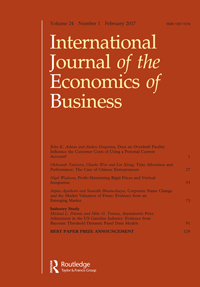
Bank-Firm Relationships and International Banking Markets
in: International Journal of the Economics of Business, No. 3, 2002
Abstract
This paper reviews how long-term relationships between firms and banks shape the structure and integration of banking markets worldwide. Bank relationships arise to span informational asymmetries that are endemic in financial markets. Firm-bank relationships not only entail specific benefits and costs for both the engaged firms and banks, but also directly affect the structure of banking markets. In particular, the sunk cost of screening and monitoring activities and the 'informational capital' collected by the incumbent banks may act as a barrier to entry. The intensity of the existing firm-bank relationships will determine the height of this barrier and shape the structure of international banking markets. For example, in Scandinavia where firms maintain few and strong relationships, foreign banks may only be able to enter successfully through mergers and acquisitions. On the other hand, Southern European firms maintain many bank relationships. Therefore, banks may consider entering Southern European banking markets through direct investment.

Attribute Dependence and the Provision of Quality
in: Regional Science and Urban Economics, No. 5, 2001
Abstract
Often a quality improvement necessitates modifications of varietal product features. This paper studies firms’ incentives to provide quality when this decision affects the goods’ degree of perceived horizontal differentiation. We find that the quality level hinges crucially on the interaction between the quality and the varietal product attribute. We examine the outcome of a game where firms decide on quality and price relative to what a social planner would desire. If the interaction between quality and perceived horizontal differentiation is sufficiently positive, we find for the sequential game ‘quality then price’ that the private incentives to provide quality are excessive relative to the social optimum. As a result the level and the direction of interaction between the attributes determines whether there is excessive or insufficient provision of quality.

On the Incentives to Provide Fuel-Efficient Automobiles
in: Journal of Economics, No. 2, 2001
Abstract
We argue that the provision of more fuel-efficient cars necessitates specific aerodynamic shapes. We show that the presence of this technological constraint may reduce the incentives to provide fuel efficiency. In equilibrium, cars become more similar and aerodynamic as fuel prices increase. However, the provided level of fuel efficiency falls short of the social optimal one such that a fuel-economy standard is welfare-enhancing.
Working Papers
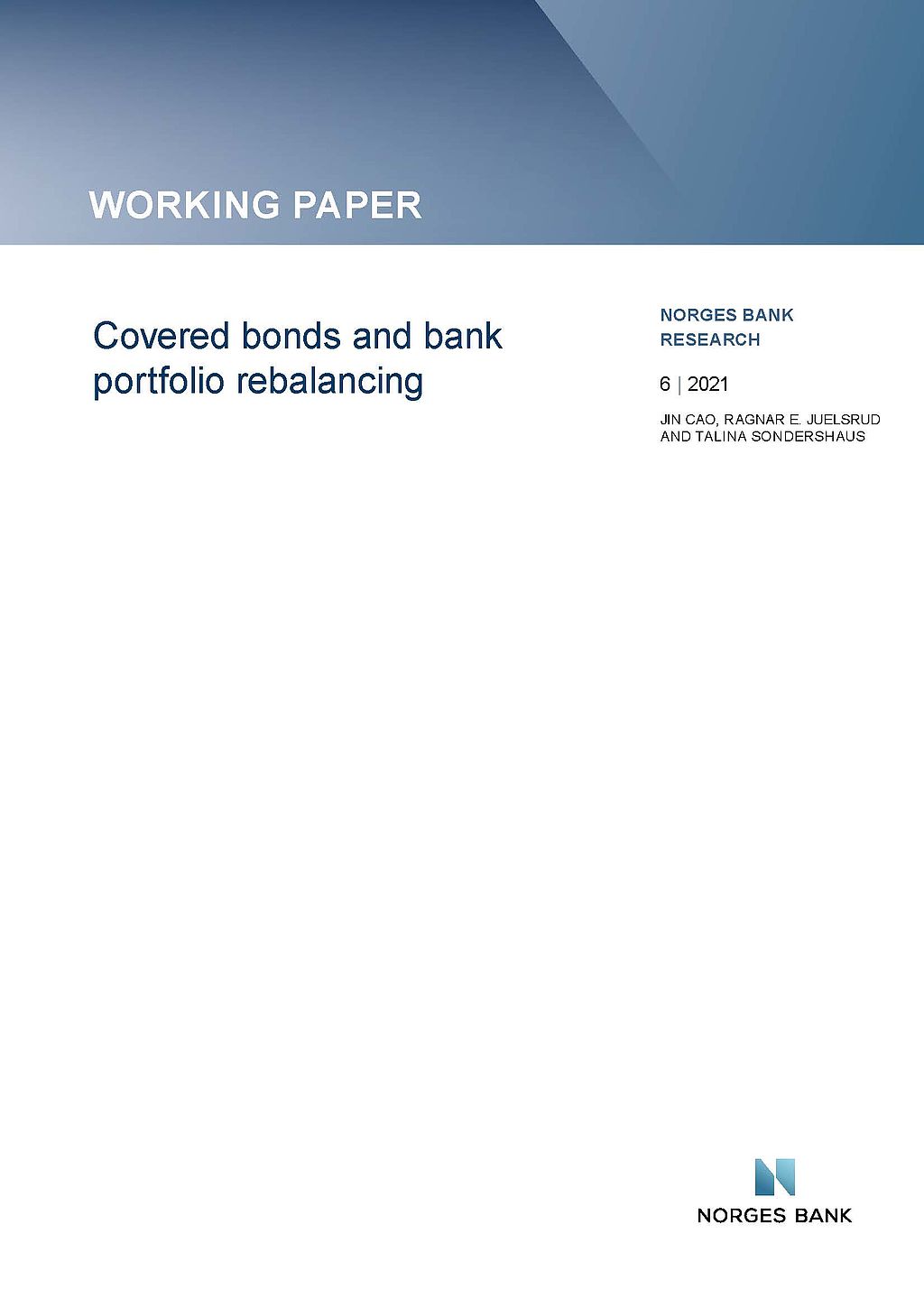
Covered Bonds and Bank Portfolio Rebalancing
in: Norges Bank Working Papers, No. 6, 2021
Abstract
We use administrative and supervisory data at the bank and loan level to investigate the impact of the introduction of covered bonds on the composition of bank balance sheets and bank risk. Covered bonds, despite being collateralized by mortgages, lead to a shift in bank lending from mortgages to corporate loans. Young and low-rated firms in particular receive more credit, suggesting that overall credit risk increases. At the same time, we find that total balance sheet liquidity increases. We identify the channel in a theoretical model and provide empirical evidence: Banks with low initial liquidity and banks with sufficiently high risk-adjusted return on firm lending drive the results.
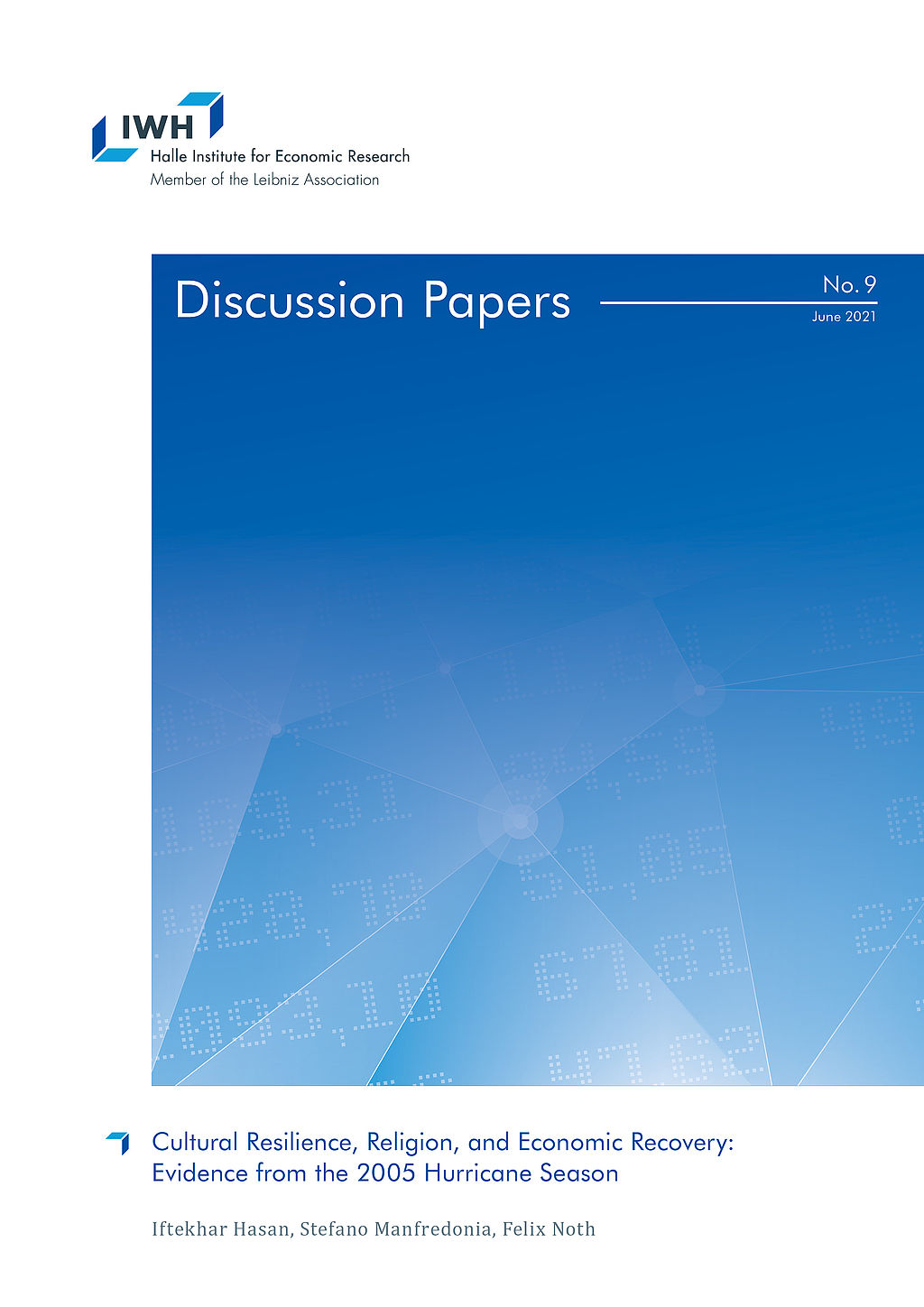
Cultural Resilience, Religion, and Economic Recovery: Evidence from the 2005 Hurricane Season
in: IWH Discussion Papers, No. 9, 2021
Abstract
This paper investigates the critical role of religion in the economic recovery after high-impact natural disasters. Exploiting the 2005 hurricane season in the southeast United States, we document that establishments in counties with higher religious adherence rates saw a significantly stronger recovery in terms of productivity for 2005-2010. Our results further suggest that a particular religious denomination does not drive the effect. We observe that different aspects of religion, such as adherence, shared experiences from ancestors, and institutionalised features, all drive the effect on recovery. Our results matter since they underline the importance of cultural characteristics like religion during and after economic crises.
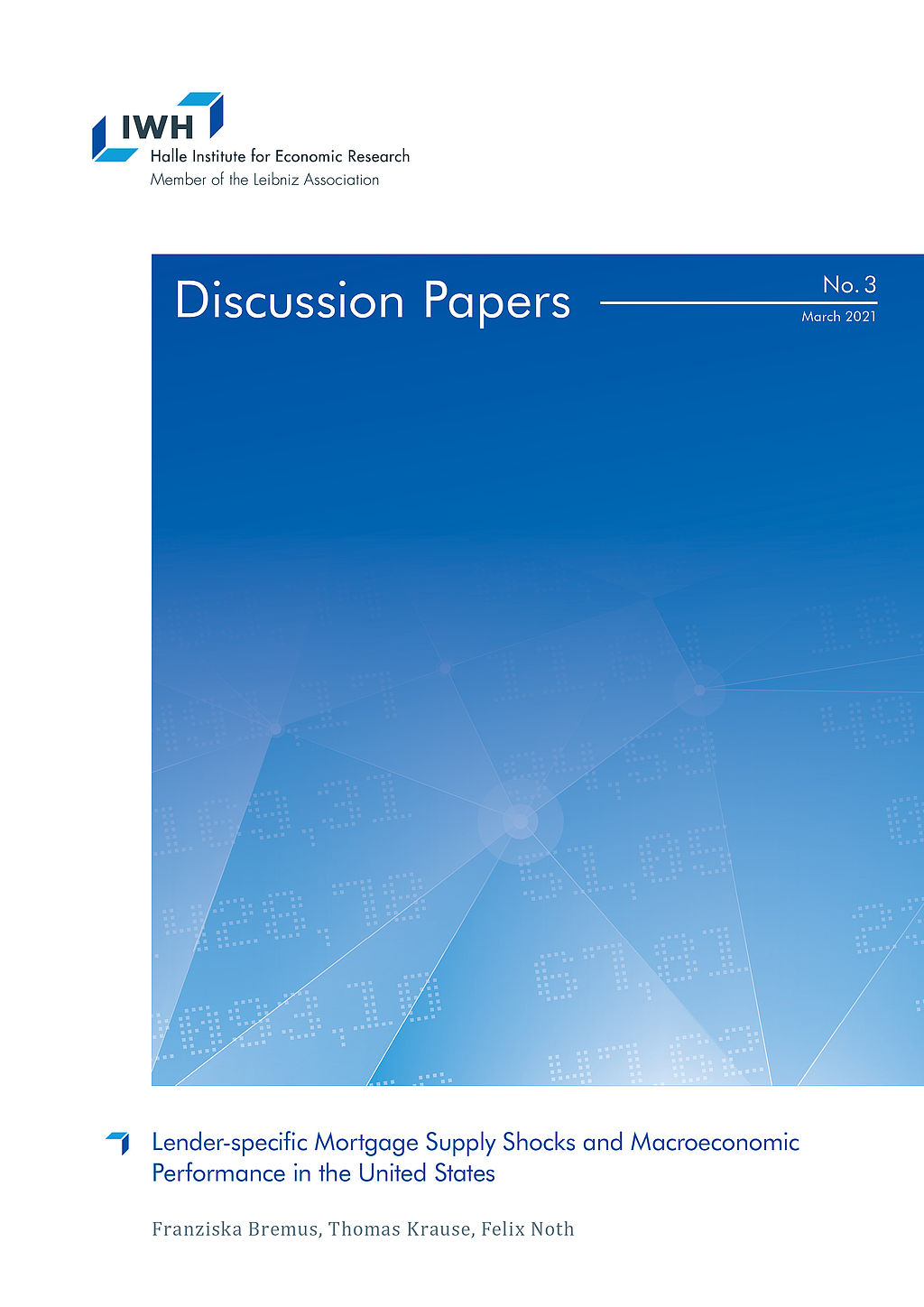
Lender-specific Mortgage Supply Shocks and Macroeconomic Performance in the United States
in: IWH Discussion Papers, No. 3, 2021
Abstract
This paper provides evidence for the propagation of idiosyncratic mortgage supply shocks to the macroeconomy. Based on micro-level data from the Home Mortgage Disclosure Act for the 1990-2016 period, our results suggest that lender-specific mortgage supply shocks affect aggregate mortgage, house price, and employment dynamics at the regional level. The larger the idiosyncratic shocks to newly issued mortgages, the stronger are mortgage, house price, and employment growth. While shocks at the level of shadow banks significantly affect mortgage and house price dynamics, too, they do not matter much for employment.
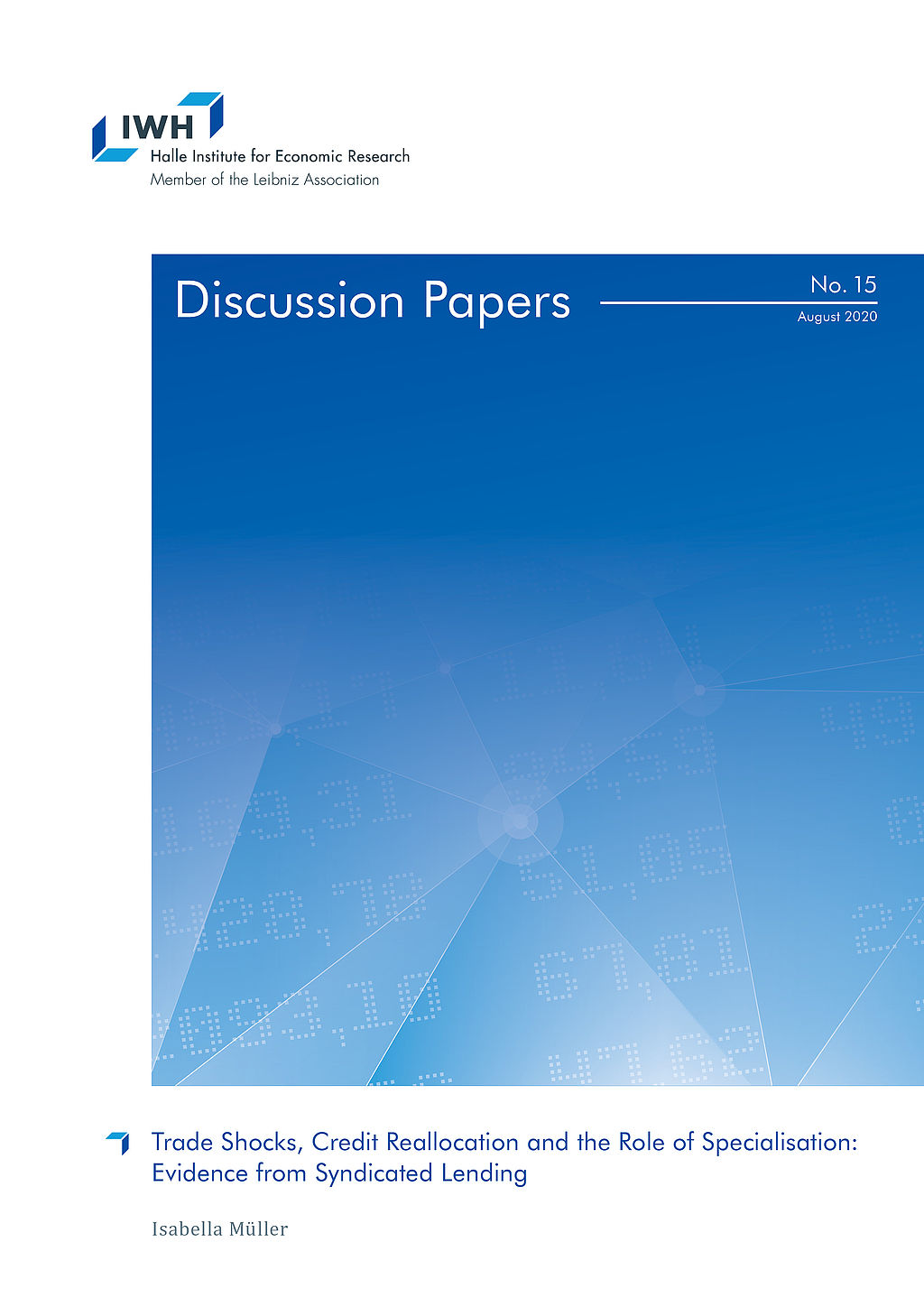
Trade Shocks, Credit Reallocation and the Role of Specialisation: Evidence from Syndicated Lending
in: IWH Discussion Papers, No. 15, 2020
Abstract
This paper provides evidence that banks cut lending to US borrowers as a consequence of a trade shock. This adverse reaction is stronger for banks with higher ex-ante lending to US industries hit by the trade shock. Importantly, I document large heterogeneity in banks‘ reaction depending on their sectoral specialisation. Banks shield industries in which they are specialised in and at the same time reduce the availability of credit to industries they are not specialised in. The latter is driven by low-capital banks and lending to firms that are themselves hit by the trade shock. Banks‘ adjustments have adverse real effects.
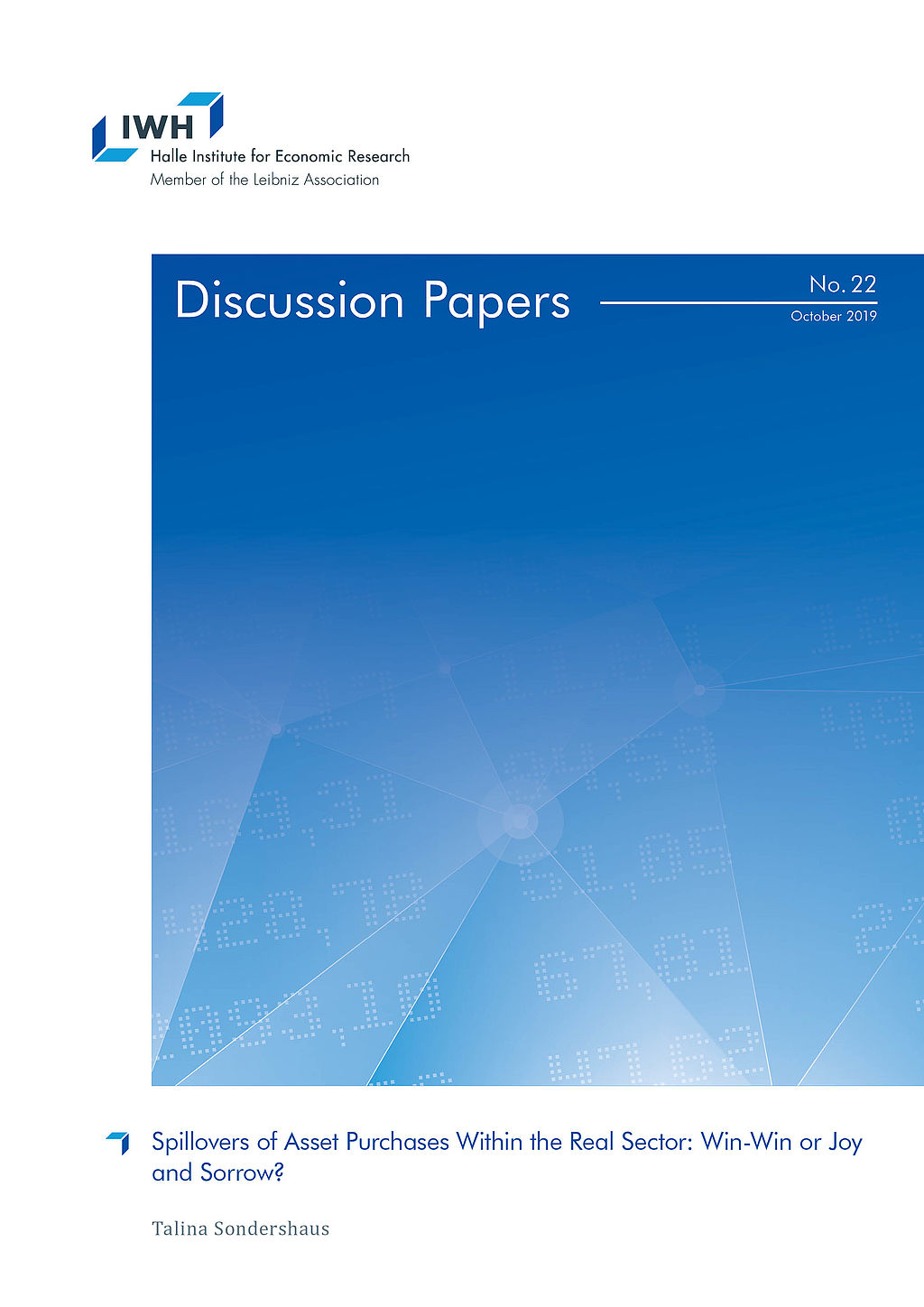
Spillovers of Asset Purchases Within the Real Sector: Win-Win or Joy and Sorrow?
in: IWH Discussion Papers, No. 22, 2019
Abstract
Events which have an adverse or positive effect on some firms can disseminate through the economy to firms which are not directly affected. By exploiting the first large sovereign bond purchase programme of the ECB, this paper investigates whether more lending to some firms spill over to firms in the surroundings of direct beneficiaries. Firms operating in the same industry and region invest less and reduce employment. The paper shows the importance to consider spillover effects when assessing unconventional monetary policies: Differences between treatment and control groups can be entirely attributed to negative effects on the control group.


















